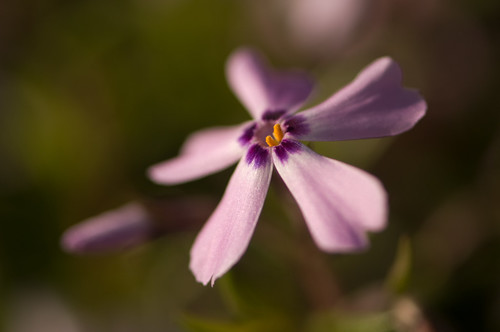
As far as our cameras, we have a digital SLR (Nikon D300) with an 18-200mm lens (with a few borrowed lenses thrown in occasionally) as well as a small Canon SD1100 IS that Micki carries in her purse. The sharpest, highest quality photos are mainly from the Nikon, although the Canon takes pretty good shots as well when the light is ideal.
Regardless of what camera you have, you can take good pictures or crappy pictures. We take our share of bad photos, but there are a few things we have learned from lots of reading that can make a difference between a boring photo and one people take notice of. Here are a few things to think about:
1. Use the rule of thirds: Placing your subject off center is more visually pleasing. Divide your scene up into thirds horizontally and vertically and place the most interesting objects at the junctions of these thirds. And by all means, don't shoot a group photo by placing your subjects heads dead center. This leaves you with a picture with the bottom half showing a few people and the top full of dead space. Put the heads in the upper third. Many cameras have guide lines in the view finder to help you out.
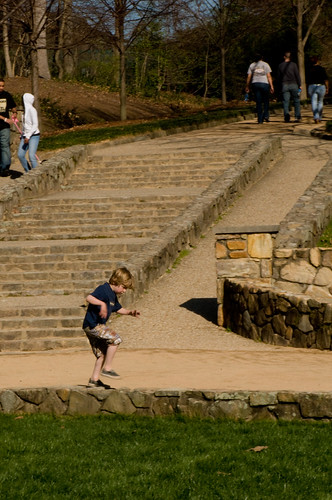

 2. Shoot more interesting angles: Try and look at the world differently through your lens than you do with your eyes normally. Pictures that show the world in a different manner than you are accustomed to seeing (close-ups, sideways, bottom-up) can be more interesting.
2. Shoot more interesting angles: Try and look at the world differently through your lens than you do with your eyes normally. Pictures that show the world in a different manner than you are accustomed to seeing (close-ups, sideways, bottom-up) can be more interesting.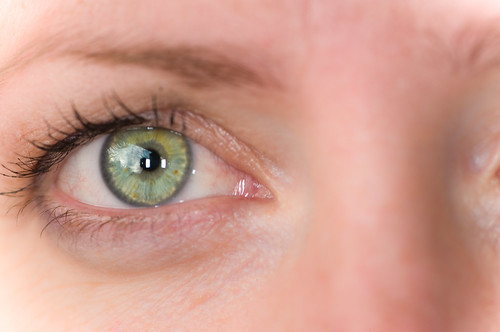
3. When photographing kids, get down on their level: Don't shoot kids from your eye level, it makes them always have to look up at you, their heads look bigger, and they aren't in natural poses. When you get low you more naturally capture their world.
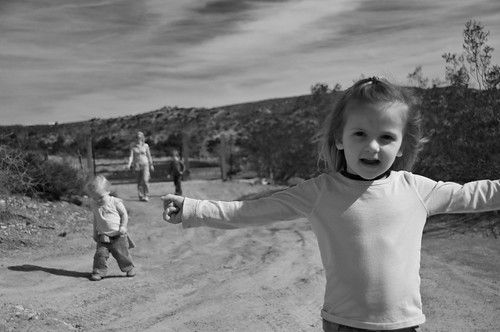
4. Use on camera flash sparingly: On camera flash gives harsh shadows and makes skin look shiny and pasty. We use a large flash mounted on the Nikon indoors in poor light which we point straight up to bounce of the ceiling. This diffuses the light, eliminating harsh shadows. If you only have an on-camera flash, you can diffuse it by covering it with a thin piece of white paper like a post-it note. Natural light coming in from a window or outside in the morning and evening is ideal.
5. Take time to crop and color correct your photos: It's great when you can perfectly frame each photo, but most photos can benefit from a little recomposing with some simple cropping to focus the picture on your subject. If you didn't follow the rule of thirds when you took the picture, you can fix that with a good crop. You can also correct white balance and color. Use Picasa or whatever photo editing software you have. We mainly use Photoshop and Lightroom. For free alternatives can use Photoshop Express online, Picnik (simpler online alternative), or download GIMP, which is a free Photoshop clone that is amazingly robust.
6. When you see a good photo, try to figure out why you like it: Chances are it is well composed with pleasing proportions and even lighting.
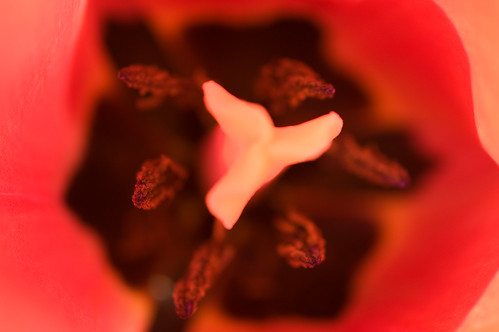
Ultimately, good photos are all in the photographer, not the gear. That doesn't mean we'll stop coveting better gear.


5 comments:
Great photography tips! Speaking of better gear...I now have two cameras sitting at my house (Cannon Rebel XSI and Canon 50 D). I'm trying to decide which one to keep and CANNOT make up my mind. Any advice? The 50 D is way nice, but a bit big and bulky - plus the lens is 28-135 (great zoom, but not loving 28 - I can't fit a room in the picture). If I keep the XSI I feel like I need to get a better lens because it just comes with 18-55. Any tips, suggestions, opinions???...from a photography expert such as yourself. I need to make a decision quick because I've been having dreams about cameras!
thanks for the advice- I definitely fall into the category of having a nice camera and still not getting good photos! I need to learn how to use it!
Thanks for the tutorial! Any suggestions for a good photo correction program that is NOT as complicated as photoshop but better than windows? We used to have adobe photoshop and I found it not very user friendly for an amateur like me. I wish I had a nice camera! Your pictures are amazing - a real talent.
In answer to Erin, I would sell the camera and lens you aren't fond of and buy a 12-24 wide angle or an 18-200, so you are almost wide angle, but have wide and zoom in one lens.
Emily, the best free, intuitive photo editing program I have used is Picasa. It can make some pretty impressive adjustments and it organizes your photos. If you want to buy a program, Adobe Lightroom is excellent, once you are over the learning curve, but it is expensive.
Nice tips. I think I'll go do a TIPS. Hey Micki, you have great hips. I could sure use some licorice whips. Or better yet, a bag of nips.
Post a Comment